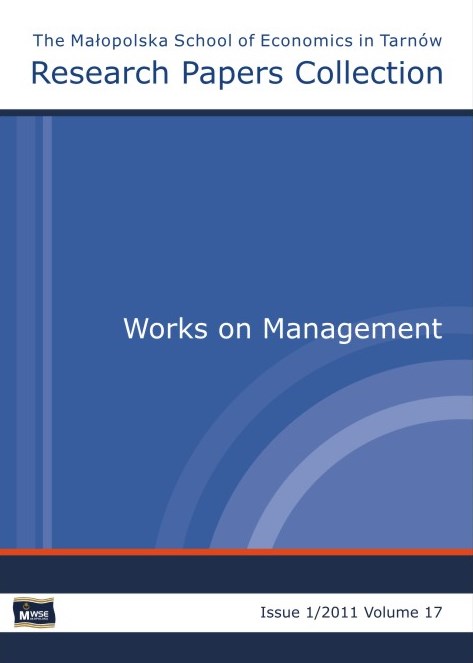Abstract
The paper presents the essence, structure and significance of management contracts in the process of company supervision and management. The basic premises for introducing management contracts and supervisor contracts resulting mostly from the growth of the company have also been characterised. In particular, the first part of the paper provides the definitions of corporate governance and ownership supervision, and mechanisms of this supervision have been identified along with statement of their effectiveness and efficiency. The theoretical grounds for management contracts have been broadly analysed, with special attention paid to the ownership rights theory, contractual view of a company (nexus contracts), the management productivity concept, the issue of trusting business partners, the theory of affectuation, the agency theory, and the stewardship theory. The predictive and projective functions of the agency theory have been criticised, which is commonly considered the leading concept in corporate governance. As regards the essence and premises for introducing management contracts, organisational and legal forms of business management have been described in detail, namely management personalisation, management autonomisation, management deconcentration and decentralisation. The analysis of the issue has been mostly focused on the provisions of a business management contract, with a special view on the subject matter of the contract, duties of both parties, responsibility of the manager, costs of the agent (manager) and the method of their compensation. The components of the manager’s salary and the methods of their determination have been defined. Finally, a postulate for building high culture of contracts in the economy in general and management contracts in particular has been included.
References
Alchian A., Demsetz H., The property rights paradigm, „Journal of Economics History” 1973, vol. 33.
View in Google Scholar
Chew D.W., Gillan S.L. (eds.), Global Corporate Governance, Columbia University Press, New York 2009. ISBN 9780231148559 (pbk).
View in Google Scholar
Dyck A., Zingales L., Control premiums the effectiveness of corporate governance systems. In: D.H. Chew, S.L. Gillan (eds.), Global Corporate Governance, Columbia Business School Publishing, New York 2009. ISBN 0231148559 (pbk).
View in Google Scholar
Fama E.F., Jensen M.C., Separation of ownership and control, „Journal of Law and Economics” 1983, no. 26.
View in Google Scholar
Fukuyama F., Kapitał społeczny. In: L.E. Harrison, S.P. Huntington (red.), Kultura ma znaczenie, przeł S. Dymarczyk, Wydawnictwo Zysk i S-ka, Poznań 2000. ISBN 83-7298-368-2.
View in Google Scholar
Gruszecki T., Współczesne teorie przedsiębiorstwa, Wydawnictwo Naukowe PWN, Warszawa 2002. ISBN 83-01-13612-X.
View in Google Scholar
Hashi I., Ramy prawne skutecznego nadzoru korporacyjnego. Analiza porównawcza wybranych krajów transformujących się, CASE – Centrum Analiz Społeczno-Ekonomicznych, Warszawa 2003. ISBN 83-7178-325-6.
View in Google Scholar
Jensen M.C., Meckling W.H., Theory of the firm. Managerial behavior, agency costs and capital structure, „Journal of Financial Economics” 1976, no. 3.
View in Google Scholar
Kozioł L., Entrepreneur’s business models, „The Małopolska School of Economics Research Papers Collection” 2010, nr 2 (16).
View in Google Scholar
Kraft J., Ravix J.L., Theories of the firm. In: R. Arena, C. Longhi (eds.), Market and Organization, Springer Verlag, Berlin, Heilderberg 1998.
View in Google Scholar
Laffont J.-J., Martimort D., The Theory of Incentives. The Principal-Agent Model, Princeton University Press, Princeton 2002. ISBN 0691091846.
View in Google Scholar
Morris M., Schindehuttem M., Allen J., The entrepreneur’s model. Toward a unified perspective, „Journal of Business Research” 2005, no. 58.
View in Google Scholar
Mróz A., Umowy menedżerskie, „Personel” 1997, nr 5, dodatek specjalny.
View in Google Scholar
Nogalski B., Dadej R., Kodeks Dobrych Praktyk jako narzędzie budowania zaufania na rynku kapitałowym. In: S. Rudolf (red.), Tendencje zmian w nadzorze korporacyjnym, Wydawnictwo Uniwersytetu Łódzkiego, Łódź 2006. ISBN 83-7171-932-9.
View in Google Scholar
Schleifer A., Vishny R.W., A survey corporate governance, „Journal of Finance” 1997, vol. 52, no. 2.
View in Google Scholar
Urbanek P., Wynagrodzenia menedżerów z perspektywy menedżerskiej i neoklasycznej teorii przedsiębiorstwa. In: S. Rudolf (red.), Tendencje zmian w nadzorze korporacyjnym, Wydawnictwo Uniwersytetu Łódzkiego, Łódź 2006. ISBN 83-7171-932-9.
View in Google Scholar
Zingales L., Insider ownership and the decision to go public, „Review of Economics Studies” 1995, vol. 62.
View in Google Scholar
© Copyright by Małopolska School of Economics in Tarnów. The articles are available under the Creative Commons Attribution NonCommercial-NoDerivatives 4.0 International License


